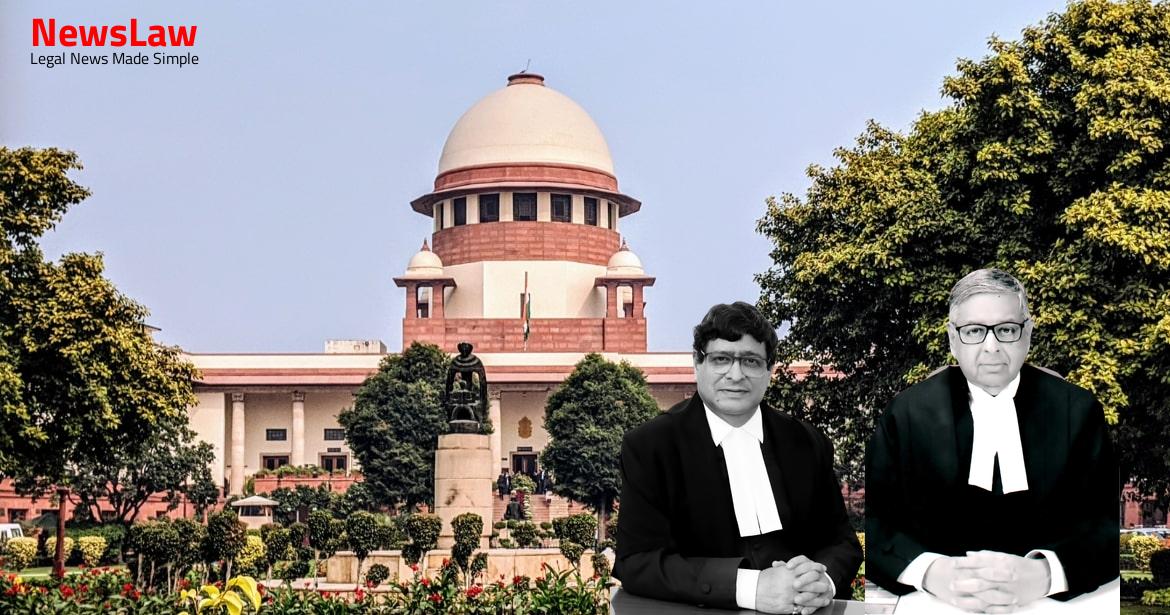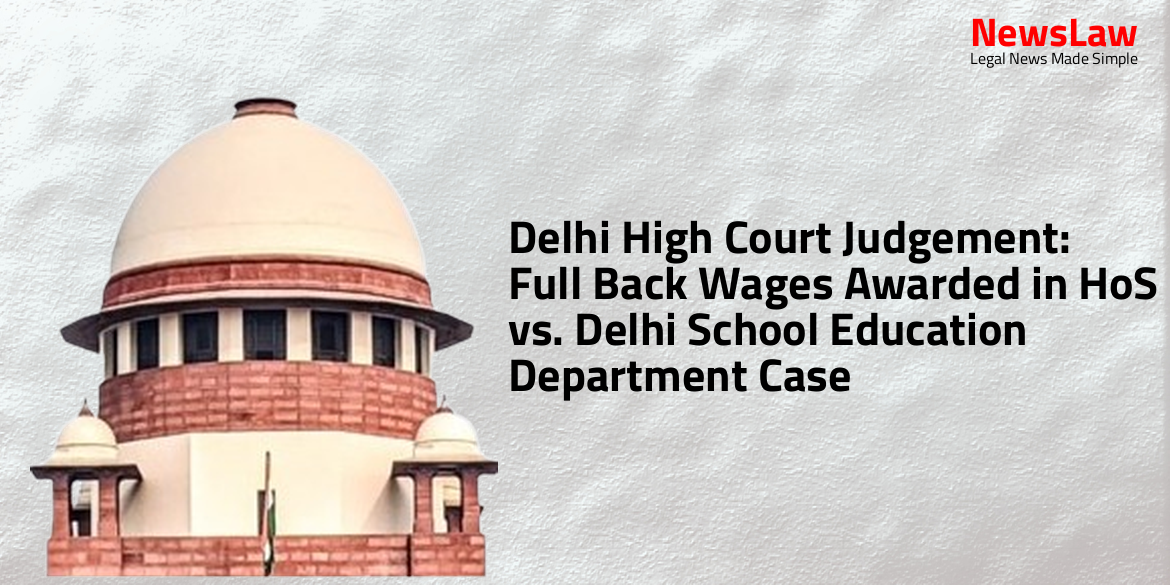In a recent legal case involving a fatal bus accident, the court’s meticulous legal analysis resulted in the enhancement of compensation for the victims. The case delved into various aspects of the Motor Vehicles Act to ensure that the compensation granted was fair and just. This summary highlights the key considerations made by the court in determining the enhanced compensation amount, emphasizing the importance of legal precedent and comprehensive analysis in such matters.
Facts
- Deceased Sudesh Kumar was a passenger in a bus that fell into river Chenab on 11.08.2009.
- The Appellants alleged that the accident was due to rash and negligent driving, resulting in the death of Sudesh Kumar.
- Sudesh Kumar was a Head Constable in the Railway Protection Force and was 32 years old at the time of the accident.
- The claim petition was filed under Section 166 of the Motor Vehicles Act seeking a total compensation of Rs.50 lakhs.
- The Appellants feel deprived of just compensation under Section 168 of the MV Act, leading to this Appeal.
- The Tribunal found that the accident was caused by the rash and negligent driving of Mohd. Rasid, the deceased husband of the first Respondent.
- The Appellants filed for enhancement of compensation in the Punjab and Haryana High Court, leading to the current Appeal.
- The 4th Respondent, State Road Transport Corporation, was held jointly and severely liable with Mohd. Rasid for the compensation award.
- The compensation amount was quantified as Rs.17,73,704 with interest at 6% per annum from the date of filing of the petition.
- The compensation granted by the Tribunal was challenged by the Appellants, leading to F.A.O. No.5948 of 2018 before the High Court of Punjab and Haryana.
- The High Court ordered an enhanced compensation amount of Rs.2,95,000 which would carry interest at a rate of 9% per annum.
- The total re-assessed compensation by the High Court was Rs.20,68,704 after deducting the amount awarded by the Tribunal.
Also Read: From Nominee to Disqualified: Supreme Court Scrutinizes Age Evidence, Declares Election Invalid
Arguments
- The Appellants argue that no amount was granted for ‘loss of estate’ and ‘funeral expenses’.
- They claim that the High Court did not consider the future prospects of the deceased while quantifying the amount for ‘loss of dependency’ and other heads of compensation.
- Refers to the decision of a Constitution Bench in National Insurance Co. Ltd., v. Pranay Sethi and Others.
- The High Court granted just compensation under Section 166 of the MV Act, and further enhancement of compensation is not warranted.
- Compensation under ‘loss of love and affection’ is impermissible, and only Rs. 40,000 under ‘loss of consortium’ is permissible based on the decision in Pranay Sethi’s case.
- The Tribunal’s award was reassessed by the High Court, increasing compensation by Rs. 2,95,000.
- Future prospects of the deceased, especially considering his age and job, were not taken into account in the initial compensation award.
- Referring to Pranay Sethi’s case, it is noted that future prospects should be considered, with an addition of 50% of actual salary if the deceased had a permanent job and was below 40 years of age.
Analysis
- The Tribunal and High Court did not grant any amount towards ‘loss of estate’ and ‘funeral expenses’.
- Under ‘loss of dependency’, an enhanced amount of Rs. 8,84,160/- was awarded to the Appellants.
- There was an argument for adding 50% of the actual salary of the deceased while determining income, which was upheld.
- Appellants were awarded Rs. 15,000/- each under the head of ‘loss of estate’ and ‘funeral expenses’.
- Compensation under the head ‘loss of care and guidance’ for minor children was not considered a valid head for compensation.
- The excess amount granted under ‘loss of consortium’ and ‘loss of love and affection’ was interfered with based on a binding decision.
- The income of the deceased was taken as Rs.13,817/- after deducting various allowances.
- Determination of income considered 50% of the actual salary and 1/3 of the monthly income was deducted towards personal expenses.
- The ‘multiplier’ for compensation calculation was correctly identified as 16 based on the age group of the deceased.
- Re-assessment of compensation for ‘loss of dependency’ considering multiplicand and multiplier resulted in Rs. 26,52,864/-.
- The Tribunal and High Court granted Rs. 17,68,704/- under the head ‘total loss of income’ using the multiplier method.
- The decision in Rajesh’s case is not a binding precedent in this matter.
- Compensation granted cannot be seen as an apology for compensation.
- An additional compensation of Rs. 35,000 granted under ‘loss of consortium’.
- Interference with compensation granted under ‘love and affection’ needs consideration.
- The concept of ‘just compensation’ is based on fairness, reasonableness, and equitability.
- The amount for ‘loss of parental consortium’ should be in line with Pranay Sethi’s case.
- The aim is to achieve an acceptable degree of proximity to arithmetical precision in compensation determinations.
- A decision of the Supreme Court enunciating a principle of law applies to all cases from inception.
- Conventional heads where compensation is awardable include ‘loss of estate’, ‘loss of consortium’, and ‘funeral expenses’.
- Compensation of Rs. 25,000, Rs. 1 lakh, and Rs. 1 lakh each were recognized for specific losses by the Constitution Bench.
- Compensation for ‘love and affection’ is impermissible, but for specific losses like ‘loss of spousal consortium’ and ‘loss of parental consortium’, it is admissible.
- Standard compensation rates for ‘loss of consortium’ and ‘funeral expenses’ were specified by the Constitution Bench.
Also Read: Exemption from Enhanced Power Tariff: Withdrawal of Concession based on Date of Energisation
Decision
- Loss of spousal consortium awarded.
- Loss of parental consortium awarded to minor children at the rate of Rs.40,000 each.
- Additional compensation under ‘loss of dependency’ calculated as Rs. 8,84,256.
- Loss of estate compensation calculated as Rs. 35,000.
- Funeral expenses awarded.
- Adjustments made for ‘love and affection’ grant to minor children from the compensation amount.
- Re-assessment of compensation for the death of Shri Sudesh Kumar.
- Enhanced compensation of Rs. 10,29,260 granted to the Appellants.
- Payment deadline and interest set in case of failure to pay.
Case Title: RAJ BALA Vs. RAKEJA BEGAM (2022 INSC 1107)
Case Number: C.A. No.-007604-007604 / 2022



